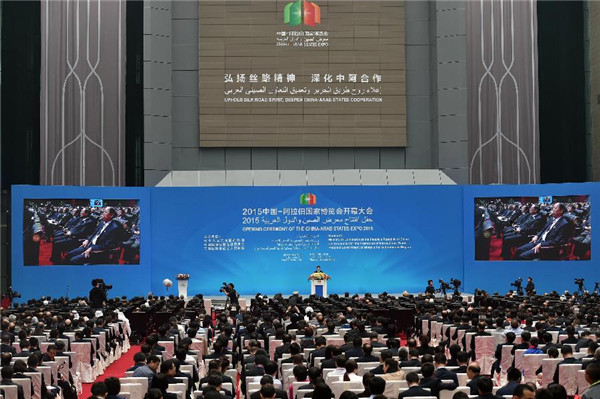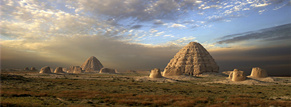China, Arab States to explore cooperation
Updated: 2015-09-11
 |
|
The opening ceremony of the China-Arab States Expo 2015 is held in Yinchuan, capital of northwest China's Ningxia Hui Autonomous Region, Sept. 10, 2015. The second China-Arab States Expo, a platform to promote ties between China and the Middle East countries, kicked off on Thursday, and will run until Sunday in Yinchuan, capital city of Ningxia. (Xinhua/Li Ran) |
YINCHUAN, Sept. 10 (Xinhua) -- State leaders, government officials and corporate executives on Thursday gathered for a four-day expo to seek cooperation opportunities in northwest China's Ningxia Hui Autonomous Region.
The second China-Arab States Expo, a platform to promote ties between China and Middle Eastern countries, kicked off in Yinchuan, capital of Ningxia, home to more than 10 percent of China's 20 million Muslims.
The event will feature trade fairs and seminars on e-commerce, new energy, agriculture, education, tourism and medical care. Domestic and foreign attendees will share ideas and try to strike deals.
President Xi Jinping said in a letter of congratulations that the exposition is of great significance to promoting Sino-Arab exchanges, consolidating friendship, and enhancing pragmatic cooperation.
"China and the Arab States are good friends with mutual trust, as well as good partners in seeking common prosperity," said Xi, adding that the Arab States have been responding actively to his Belt and Road Initiative.
"China will uphold the Silk Road Spirit, as well as learn and cooperate in a peaceful, open and inclusive manner [...] with the Arab States," said the president.
State Councilor and Minister of Public Security Guo Shengkun said in a speech at the opening ceremony that China and the Arab States should further cement political trust, continue to open up markets and facilitate two-way trade and investment.
Guo said China will encourage enterprises and financial institutions to participate in the construction of railways, highways, ports, electricity and telecommunications infrastructure in Arabian countries.
He said the Silk Road Fund and the Asian Infrastructure Investment Bank will support economic development in Muslim regions.
The state councilor also urged more cultural and people-to-people exchanges between the two civilizations.
Jordanian King Abdullah II Bin Al-Hussein, Mauritanian President Mohamed Ould Abdel Aziz and other foreign leaders attended the opening ceremony.
Jordan is the guest country of honor for the 2015 expo. On Wednesday, Xi and the Jordanian king signed a joint statement in Beijing on the establishment of a strategic partnership between the two countries.
They will boost cooperation in trade, investment, industrial capacity, infrastructure, energy, finance and law enforcement, among other sectors, and increase cultural, educational and military-to-military exchanges, according to the statement.
King Abdullah said Jordan values the traditional friendship with China and stands ready to boost cooperation with China in pursuit of common development and prosperity.
Trade between China and the Arab States exploded from 10 million U.S. dollars in 1950s to 251.2 billion U.S. dollars in 2014, which made China the second largest trade partner of the Arab States. They aim to increase trade volume to 600 billion U.S. dollars in the ten years to come.
Arabian students in China increased by 11.7 percent in 2014 to 14,000 people. Nearly one million trips were made to the Arab States last year, and China received 340,000 trips from these countries.
The biennial China-Arab States Expo is jointly sponsored by the Ministry of Commerce, the China Council for the Promotion of International Trade, and the government of Ningxia.


